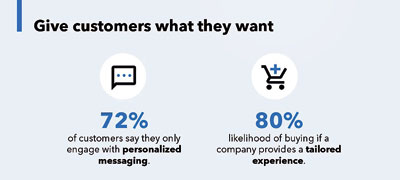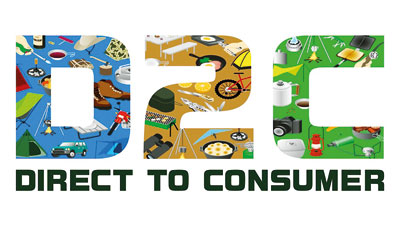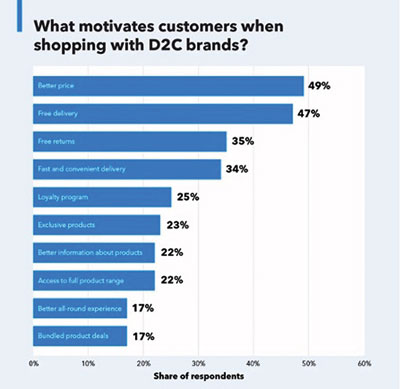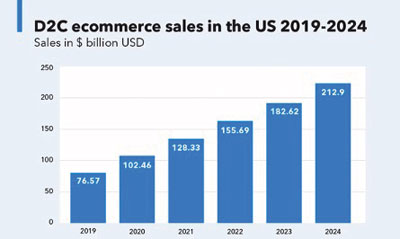What is D2C?
View(s): D2C is referred to a business that sells directly to consumers produces its goods and delivers them to customers. Simply enough, it eliminates the need for “middlemen” like retail establishments, distributors, or wholesalers. Online marketplaces or a brand’s own ecommerce platform, such as a website, can be used for sales.
D2C is referred to a business that sells directly to consumers produces its goods and delivers them to customers. Simply enough, it eliminates the need for “middlemen” like retail establishments, distributors, or wholesalers. Online marketplaces or a brand’s own ecommerce platform, such as a website, can be used for sales.
Although D2C (or DTC) selling is hardly a novel idea in the dynamic world of ecommerce, the velocity at which it has advanced during the pandemic years would have been virtually impossible to foresee.
Businesses all across the world were compelled to change their business models in order to survive COVID, making direct-to-consumer selling substantially more tempting almost immediately.
D2C e-commerce sales in the US have more than tripled over the past six years, driving the industry from $36.08 billion to $128.33 billion. While many might reasonably wonder if this growth is sustainable in a post-pandemic environment, that amount is anticipated to reach $212.90 billion by the end of 2024, fast allaying any worries.
 Why do consumers choose D2C?
Why do consumers choose D2C?
Consumers have, of course, played a key role in the development of D2C, and the growth statistics are unequivocal evidence of how well-positioned for success are firms that can successfully combine exceptional products with a first-rate customer experience. Better pricing was the primary factor cited by 49% of customers as to why they choose to buy directly from a brand as opposed to a retailer, according to Statista. Free delivery comes in second with 47% of consumers favouring it, and free returns come in first with 35% of consumers.
B2C Vs D2C
B2C - Any company that sells goods or services to consumers is considered a B2C firm. Retail enterprises, for example, can buy goods from other producers and sell them to their own clientele.
D2C- Since these companies are still selling to end users, D2C is a type of B2C. The main distinction is that these companies don’t rely on a third party; instead, they offer their own manufactured goods or services directly to customers through channels or retail locations they own.

Benefits of D2C Control in Pricing
Pricing is typically the most crucial factor in convincing a potential client to purchase your product or service. In theory, a company selling through its own direct-to-consumer channels should be able to reduce its price point to make itself more appealing and competitive.
Additionally, brands have the opportunity to boost their own profit margins by setting their own retail prices without input from retailers.
CRM and data ownership
Direct-to-consumer (D2C) businesses have complete control over the CRM, sales, and customer data, allowing them to fully optimise their business models and marketing approach in accordance.
By having access to this data, the business can also offer a more individualised customer experience, which is something that is, as we all know, in greater demand than ever. While 80% of customers are more inclined to make a purchase from a company that delivers a customised experience, 72% of customers will only connect with individualised messaging.
Command over brand reputation
D2C selling enables businesses to fully manage every facet of the public’s perception of their brand. People who depend on other shops forfeit a sizeable percentage of this as soon as the product is delivered to these stores. The D2C model is the only method to manage all of these diverse, crucial factors, from sales messaging and customer support to how a product is displayed on a shelf or website.
Go-to-market at your own pace
In contrast to dealing with retailers that are more concerned with producing large amounts of sales, businesses are able to create, test, and distribute items on a smaller scale while targeting a much more specialised audience when external influences are removed.
Similar to this independence, D2C firms have the option to decide when and if they wish to adopt the omnichannel strategy that many customers want.
Build customer loyalty
One of the biggest challenges any business faces is building a loyal, repeat customer base. With a D2C approach, there are a number of steps brands can take in nurturing this, from reward programs and personal notes with orders, to special gifts and discounts on a customer’s birthday.
Conclusion
Although the phrase “D2C” is new to our lexicon, it has actually been a reality since the emergence of e-commerce. Numerous businesses sell goods to final customers directly online. The goal of this essay, however, was to alert brand marketers and business owners in the SME sector to the fact that the internet’s information superhighway gives them a better opportunity to increase their revenues while providing their end users with more value. The only drawback with this strategy that can be foreseen is that it will significantly increase the number of logistical characteristics that manufacturers’ KPIs already include.
HitAd.lk is the best and biggest mobile phone market in Sri Lanka, and we guarantee you will find what you need here from our extensive listing of mobile phones for sale in Sri Lanka. Whether it’s a budget-priced smartphone for communication, or higher end features with advanced connectivity, there are many different options from which to choose from on our site!


